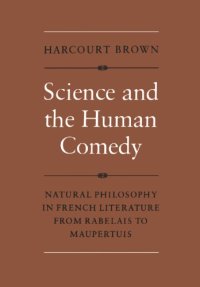
Ebook: Science and the Human Comedy: Natural Philosophy in French Literature from Rabelais to Maupertuis
Author: Harcourt Brown
- Tags: Gothic & Romantic, Movements & Periods, History & Criticism, Literature & Fiction, French, European, Regional & Cultural, History & Criticism, Literature & Fiction
- Series: Romance
- Year: 1976
- Publisher: University of Toronto Press
- Language: English
- pdf
New scientific theories, methods, and objectives exert subtle and often unnoticed influences on literary creation. The developments of the attitudes and aspirations of French scientists between the Renaissance and the Revolution and the impact of these new outlooks on French literature form the theme of this book by an authority in the interdisciplinary treatment of science and literature. Implicit in the author's exploration is the view that in the development of the scientific revolution there was no overall design, but rather random growth; human beings turn up at various moments, some of them appropriately, some of them not, so that the record is in part a story of successful endeavour, in part a comedy little short of farce. in the historical panorama of this book, four auhors, each known for his ironic, even comic, insight into the human condition, are chosen to illustrate the theme. As men of letters, Rabelais and Voltaire exhibit well-defined scientific interests, while Pascal and Maupertuis were drawn from their scientific vocations into the discussion of ideas in literary forms. Consideration of their similarities and differences suggested the title, Science and the Human Comedy. This work is a valuable contribution to our understanding of the historical and cultural conditions accompanying the advancement of science in a critical period, as well as of several ways in which the process was reflected, sometimes directly, more often indirectly, in literature.
(University of Toronto Romance Series 30)